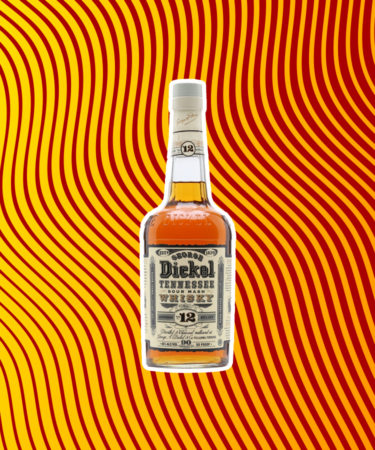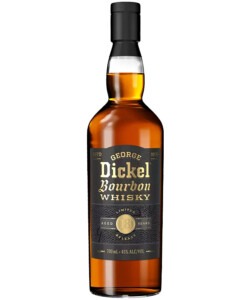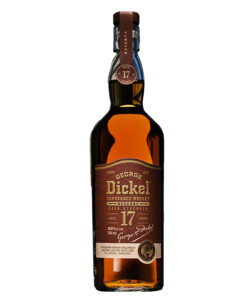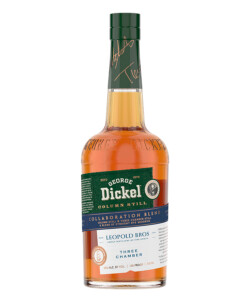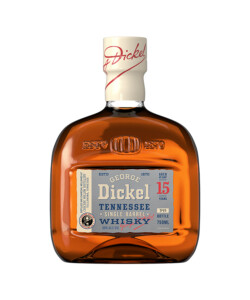It sometimes gets confused for bourbon or overshadowed by its top rival, Jack Daniel’s, but George Dickel ranks as the second-largest manufacturer of Tennessee whiskey. Lodged in a rustic corner of Tennessee, 77 miles southeast of Nashville – closer to Chattanooga and nearer still to Jack Daniel’s hometown of Lynchburg – Dickel produces whiskey much as it has since its beginnings in 1870.
A trip to the distillery feels like stepping into a movie set for an old western, where the air smells like burning maple and an up-and-coming country music star may just strum his guitar while rocking in a chair on the wooden porch.
Many factors distinguish the whiskey company from any other. Here are nine.
Never Mind the Spelling: It’s American.
In 1866, German immigrant George Augustus Dickel founded his first American business, a liquor shop in Nashville. Dickel was 48 years old. As a child growing up in Europe, though, Dickel considered Scotch the ultimate whisky. So when he started making his own spirit, he adopted the Scottish spelling, “whisky.”
Cascade Hollow Gives It a Home and a Name.
In 1878, Dickel invests in and buys a lot of whiskey from a new distillery called Cascade Hollow, located in Coffee County, between Nashville and Chattanooga. Eventually, his partners buy the whole company, then enlarge the distillery to produce their own whisky under the name Geo. A. Dickel’s Cascade Tennessee Whisky.
Now owned by the Diageo corporation, and officially called “George Dickel Tennessee Whisky,” it’s still distilled and aged here. The distillery is located in the town of Tullahoma. It is part of the American Whiskey Trail and offers one-hour public tours almost every day.
Three of Its Whiskies Are Named After Numbers, but They’re Not Age Statements.
According to a Dickel spokesperson, “The numbers behind No. 8 + No. 12 are an unsolved mystery, as they do not relate to the number of years the whisky is aged.”
Aged for 5 to 7 years, George Dickel Classic No. 8 Whisky balances flavors of vanilla and caramel to create the distillery’s signature whisky. In 2010, it won a gold medal at the San Francisco World Spirits Competition.
Aged for 6 to 8 years, George Dickel Superior No. 12 blends older whiskies to create what the company describes as “deeper, more assertive flavors and an incredibly smooth finish.” This spirit has won 17 prestigious awards since 2002, including gold and double gold medals from the San Francisco World Spirits Competition and the Beverage Tasting Institute.
The unaged George Dickel No. 1 contains the same mash bill as No. 8 and No. 12 but spends no time in the barrel and is thus sold clear.
Its Rye Whisky Has a LOT of Rye.
To qualify as a legally designated rye whiskey in America, a spirit requires a mash bill of at least 51 percent rye. George Dickel Rye’s grain bill contains 95 percent rye (and 5 percent malted barley). The result, according to the company: “fruit notes that maintain upon first taste and then finishes with a long, composed spiciness.” Substitute it for bourbon in cocktails like the Old Fashioned and the Manhattan.
George Dickel Distills Tennessee Whiskey, Not Bourbon.
In 1964, Dickel released the first of its current products, Dickel Black Label Old No. 8 and Dickel Tan Label Superior No. 12. Though the federally defined specs of Tennessee whiskey mirror those of bourbon (51 percent corn, plus rye and barley, then aged in charred new American white-oak barrels), the liquid additionally goes through what’s called the Lincoln County Process, meaning that it gets filtered through charcoal before aging.
The charcoal used for filtering Tennessee Whiskey comes from sugar maple trees and is burned on premises at Cascade Hollow. Because the charcoal strips out additional congeners, it’s believed to make for a lighter, mellower product than bourbon. Therefore, the Lincoln County Process is also called “charcoal mellowing.”
It Takes Chilling Very Seriously.
According to legend, Dickel decided early on that whiskey produced over the winter tastes smoother. To this day, Cascade Hollow distillery chills its liquid to 40 degrees before charcoal-filtering it. To advertise this quirk, the brand has used the tagline “Mellow as Moonlight.”
Its Slogan Is ‘Handmade the Hard Way.’
Cascade Hollow is the rare distillery that uses almost no computers. Instead, distillers hand-weigh grains and manually move heavy loads of charcoal from where they burn it in front of the visitors center to the distillery across the street.
Its First Collaboration Was Spicy.
Dickel keeps only a few expressions on the market at a time. So its first outside production partnership marks an innovation for the distillery. Joining with the southern Louisiana hot sauce company Tabasco, Dickel ages its whisky for 30 days on wooden barrels that held maturing Tabasco for three years. Distillers then distill Tabasco’s original sauce into an essence they blend with the whiskey to create George Dickel Tabasco Brand Barrel Finish. Dickel nicknames the whisky “Hot Dickel.”
The liquid is mellow and not too hot, and comes in at 70 proof.
You Can’t Buy a Drink at the Dickel Distillery. For now.
Tennessee state lawmakers passed a bill last year to allow drink sales at distilleries, even in dry counties. Dickel will start selling drinks at an undetermined date in the near future. For now, at Dickel, you can sample small portions of whisky as part of your $12 tour ticket, and you can buy whisky to take home.
In case you’re wondering, Coffee County is considered “moist,” meaning that it straddles being both a dry county, where you can’t buy alcohol, and a wet country, where you can.
